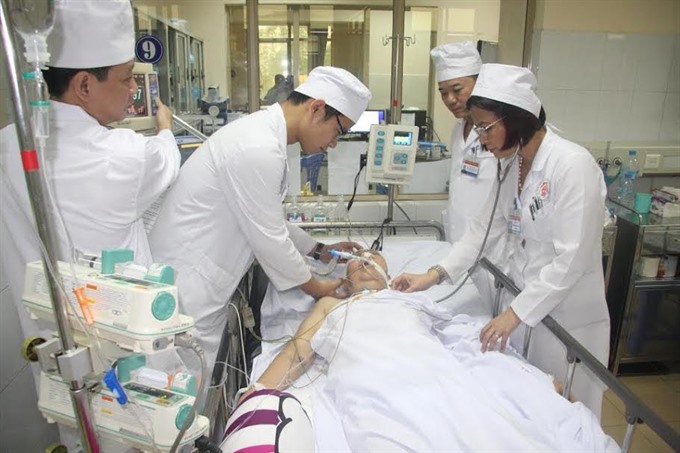 Society
Society

On a recent Saturday morning in the meeting room of Tâm Đức Heart Hospital in District 7, HCM City, a seminar was held on “Atrial fibrillation effective management: the role of new generation anticoagulants in preventing stroke in atrial fibrillation patient”.
 |
| Illustrative Image. — Vietnamnet.vn |
HCM CITY — On a recent Saturday morning in the meeting room of Tâm Đức Heart Hospital in District 7, HCM City, a seminar was held on “Atrial fibrillation effective management: the role of new generation anticoagulants in preventing stroke in atrial fibrillation patient”.
It was a unique event in the fact that all participants were heart disease patients or people with an elevated risk of stroke.
The seminar disseminated useful information as doctors discussed what causes atrial fibrillation (AF), how to control it and what new generation anti-coagulants are available to treat atrial fibrillation.
The seminar has been a regular activity organised by Tâm Đức Hospital in recent years for its stroke patients club.
Dr Tôn Thất Minh, the hospital’s director, said the incidence of stroke is increasing globally and in Việt Nam due to modern habits like smoking and eating fast food and work-related stress.
Yet people barely know about it, he said.
“They know a stroke is dangerous since it could cause death. Many do not know how to protect themselves from the disease, how a stroke will seriously affect their lives or what to do when a family member suffers a stroke.”
A stroke will impact both the patient and their families, he said.
It was for this reason that the hospital, with sponsorship by Bayer Vietnam, set up the club for stroke patients to share knowledge and experiences about the disease, how to prevent it and cure it, how to take care of stroke patients, and how to use medicines correctly.
The club has achieved useful results.
Minh told Việt Nam News: “Patients’ knowledge has significantly improved compared to two years ago. They know a lot about the disease and some of them can talk about it like a doctor.”
Since in the case of stroke it is better to prevent than cure, providing knowledge about it is critical, he said.
Trịnh Khắc Nhơn, 58, of District 3 told Việt Nam News that two years after joining the stroke patients club in Tâm Đức Hosptial he has acquired a lot of knowledge.
Before joining the club he would often seek information on social networks or from people.
“There are many sources of news about medicines and methods to treat heart diseases and stroke. But after joining the club I have discovered all that information is not correct.”
He has been taught about new generation medicines and how to use them.
He also said he has passed on to relatives and friends the information he has acquired.
Nguyễn Thị Bích Hoa, 48, of District 1 is another member of the Tâm Đức Heart Hospital’s stroke patients club. She regularly goes to the club and, thanks to information acquired there, can take care not only of herself but also her mother in the correct way.
Such a club has been set up not only at Tâm Đức Hospital but also many other hospitals like Chợ Rẫy and Thủ Đức Hospital, and they have become popular among patients and their families.
A stroke club is useful not just for patients and their relatives since when someone gets a stroke, their whole family is impacted.
At a seminar Bayer organised in Singapore on stroke, a stroke victim, Anthony Quek, surprised attendees by saying the lives of the five other people in his family too had been affected after he had the stroke.
He recalled the difficult early days, saying he couldn’t walk or take a bath by himself, and needed his family’s support for everything. Normal life had ceased to exist, and the five other members in his family had to serve him.
Dr N Venketasubramanian Ramani of Raffles Hospital in Singapore said: “A stroke occurs when the blood supply to any part of the brain is blocked, which in turn cuts off the oxygen supply essential to the functioning and survival of brain cells. If it is not treated early enough, a stroke can damage the brain, which may leave it unable to function as it did previously.”
A stroke is a medical emergency that can have serious consequences for both patients and their families and friends, he warned.
At a seminar held to discuss stroke prevention for non-valvular atrial fibrillation patients organised late last week by the Vietnam Cardiology Association and sponsored by Bayer, Dr Nguyễn Lân Việt, the president of the association said: “To achieve better stroke prevention, especially in high-risk AF patients such as those who had a stroke, kidney failure, etc, patients need to strictly adhere to the treatment regimen regarding the use of anti-coagulants prescribed by doctors and informing doctors in time about disease conditions.”
But while underlining the dangers of strokes, doctors also assured that they are completely preventable.
“FAST” is an acronym that needs to be learnt by heart, they said.
FAST refers to Face, Act, Speak and Time: When you smile, is one side droopy? When you raise your arms, is one side weak? When speaking simple sentences, do you slur or find you are unable to do it? The doctors said anyone having any of these symptoms needs to be rushed to hospital, the last important factor being “Time”.
Remember to take the patient to a hospital as soon as possible since 60 minutes is considered the “golden hour” for treating a stroke. Within 60 minutes is the best time for cells to recover, the doctors said. — VNS




